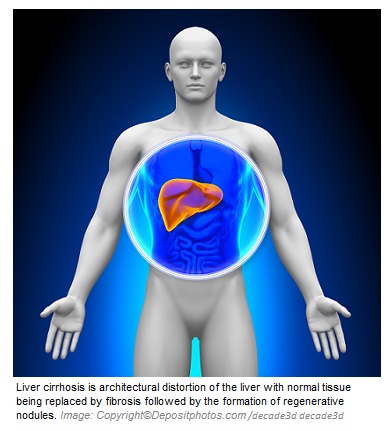 distorted and the hepatic tissue has been replaced by fibrosis and regenerative tissues. It is characterized by a hepatic impaired function.
distorted and the hepatic tissue has been replaced by fibrosis and regenerative tissues. It is characterized by a hepatic impaired function.
Signs and symptoms of the liver cirrhosis vary, and they include vague abdominal pain, malaise, loss of appetite, nausea, ascites (accumulation of fluid in the abdominal cavity), edema, jaundice, redness of the palms, enlargement of parotid gland, clubbing of the fingers, muscle wasting, decreased body hair, spider-like vascular changes in the skin, breast enlargement in men, menstrual irregularities, testicular atrophy, gastrointestinal bleeding (especially from the junction of the esophagus and stomach), and anemia.
Potential contributing factors:
- Chronic viral hepatitis (B and C).
- Alcoholism.
- Cirrhosis of the biliary ducts.
- Cystic fibrosis.
- Wilson`s disease.
- Hemochromatosis.
- Heart failure (right sided).
Nutritional Supports:
Restricted Foods:
- Saturated, hydrogenated, and Trans – fats.
- Sugars and sweets.
- Fried foods.
- Processed foods.
- Margarine.
- Lard.
- Alcohol.
- High protein diets.
- Foods with high in glycemic index.
- Egg yolks.
- Pork.
- Beef liver.
- Artificial sweeteners.
- Vegetable shortenings (shortening is a fat that is solid at room temperature and is used in cooking, baking, grilling and making pastries).
- Foods additives, preservatives, and colorings
Recommended Foods:
- Drink plenty of water: at least 2 liters a day.
- Whole grains.
- Foods high in fiber: lentils, beans, avocado, oats, and artichoke.
- Foods high in omega-3: fish, flaxseeds, chia, and hemp seeds.
- Fruits and vegetables high in flavonoids: berries, red grapes, grapefruit, pomegranate, sea buckthorn, persimmon, kiwi, beets, basil, garlic, parsley, radish, radicchio, rhubarb and parsnips.
- Onion.
- Garlic.
- Vegetables from brassica family: broccoli, cauliflower, kale, cabbage, and Brussels sprouts.
- Spices: cinnamon, turmeric, oregano, basil, cayenne, sumac, and rosemary.
- Ginger.
- Vegetables with liver detoxifying activities: beets, artichoke, carrots, and dandelion greens.
- Chlorella and spirulina.
- Green tea.
Recommended Supplements:
- BCAA (branched-chain amino acids): 3 – 10 grams a day.
- SAMe (S-adenosyl-methionine): 800 – 1200 mg a day. It has a role in detoxification process.
- Ornithine: 5 – 15 grams a day. This amino acid improves liver function in cirrhosis.
- French Maritime Pine Bark Extract: 200 – 300 mg a day. It is a potent antioxidant that reduces inflammation and improves blood circulation.
- Grape Seed Extract: 100 – 200 mg a day.
- Curcumin: 1000 – 1500 mg a day. It is a power antioxidant that detoxifies the liver.
- Milk Thistle Extract (containing 80% silymarin): 600 – 900 mg a day. It has a liver detoxifying effect.
- Bupleurum: as a capsule, 1000 – 3000 mg a day. This herb contains saikosaponnins that help people with chronic active hepatitis and may improve liver function in cirrhosis.
- L – Carnitine: 2 – 3 grams a day.
- Red Peony Root: 2 – 4 grams a day. This plant contains a glycoside called paeoniflorin that may reduce liver fibrosis.
- Selenium: 200 – 400 mcg a day.
- Lecithin (Phosphatidylcholine): 500 – 1000 mg a day. It may improve liver function by increasing the solubility of cholesterol in bile.
- Probiotics: A product that provides 15 to 20 billion organisms per serving.
- Vitamin B – Complex: A high potency product.

